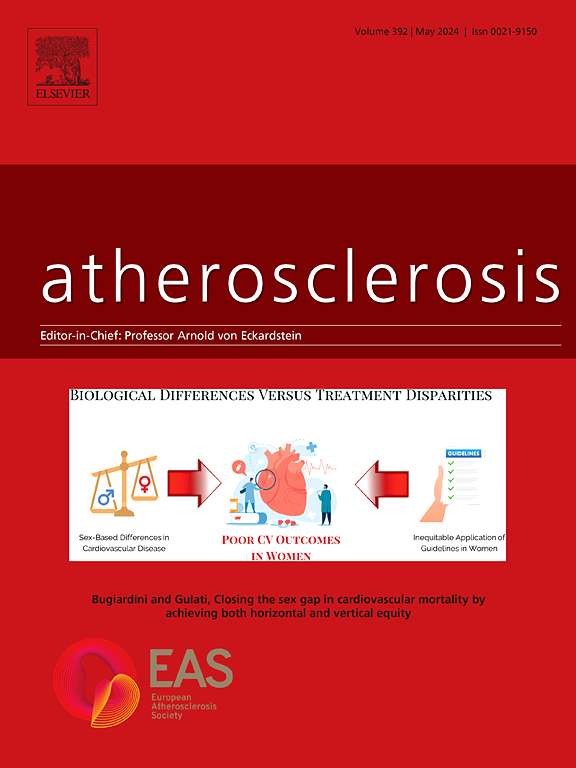Immune-related biochemical markers and 20-year incidence of atherosclerotic cardiovascular disease: the ATTICA study (2002–2022)
IF 5.7
2区 医学
Q1 CARDIAC & CARDIOVASCULAR SYSTEMS
引用次数: 0
Abstract
Background and aims
Inflammation has been associated with increased atherosclerotic cardiovascular disease (ASCVD) risk. We evaluated immune-related biomarkers regarding their ability, individually and as a composite score, to predict 20-year ASCVD incidence in an apparently healthy adult population.
Methods
A cohort of 1270 adults, who were free of ASCVD at baseline, with a 20-year follow-up from the prospective ATTICA study, were included in this analysis. Immune-related biochemical markers independently predictive of 20-year ASCVD risk were identified, and an aggregate biomarker score was developed. The incremental predictive value of this score beyond the SCORE2 was assessed using area under the receiver operating characteristic curve (AUC), net reclassification improvement (NRI), and integrated discrimination improvement (IDI).
Results
Three immune-related biomarkers -interleukin-6 (IL-6), tumor necrosis factor-alpha (TNF-α) and fibrinogen-showed the best predictive ability of 20-year ASCVD risk and were subsequently integrated into an aggregate biomarker score (ImmActScore), exhibiting a range from 0 (6 % absolute risk) to 4 (63 % absolute risk). Individual ImmActScore was independently associated with 20-year ASCVD risk (multi-adjusted HR per 1-unit:1.24, 95 %CI:1.05–1.46, p = 0.011). The 38.5 % of the 20-year incident ASCVD could be attributed to ImmActScores of ≥1. Integrating ImmActScore into the SCORE2 model yielded a continuous NRI of 0.603 and a categorical NRI of 18.4 % in the 40–50 year age group.
Conclusions
Assessing immune-related pathways may offer additional potential for long-term ASCVD risk stratification. A combined measure of IL-6, TNF-α and fibrinogen levels was associated with ASCVD events over a 20-year period. Further validation in independent cohorts is warranted.

免疫相关生化标志物与动脉粥样硬化性心血管疾病20年发病率:ATTICA研究(2002-2022)
背景和目的:炎症与动脉粥样硬化性心血管疾病(ASCVD)风险增加有关。我们评估了免疫相关生物标志物的能力,无论是单独的还是作为一个综合评分,来预测20年表面健康的成年人群中ASCVD的发病率。方法纳入1270名基线时无ASCVD的成人队列,对前瞻性ATTICA研究进行了20年的随访。确定了独立预测20年ASCVD风险的免疫相关生化标志物,并制定了综合生物标志物评分。使用受试者工作特征曲线下面积(AUC)、净重分类改善(NRI)和综合判别改善(IDI)来评估该评分超出SCORE2的增量预测值。结果三种免疫相关生物标志物-白细胞介素-6 (IL-6)、肿瘤坏死因子-α (TNF-α)和纤维蛋白原显示出20年ASCVD风险的最佳预测能力,随后被整合到综合生物标志物评分(ImmActScore)中,显示范围从0(6%的绝对风险)到4(63%的绝对风险)。个体ImmActScore与20年ASCVD风险独立相关(每1单位多重校正HR:1.24, 95% CI: 1.05-1.46, p = 0.011)。20年ASCVD事件的38.5%可归因于ImmActScores≥1。将ImmActScore整合到SCORE2模型中,40-50岁年龄组的连续NRI为0.603,分类NRI为18.4%。结论评估免疫相关通路可能为长期ASCVD风险分层提供额外的潜力。联合测量IL-6、TNF-α和纤维蛋白原水平与20年期间ASCVD事件相关。需要在独立队列中进一步验证。
本文章由计算机程序翻译,如有差异,请以英文原文为准。
求助全文
约1分钟内获得全文
求助全文
来源期刊

Atherosclerosis
医学-外周血管病
CiteScore
9.80
自引率
3.80%
发文量
1269
审稿时长
36 days
期刊介绍:
Atherosclerosis has an open access mirror journal Atherosclerosis: X, sharing the same aims and scope, editorial team, submission system and rigorous peer review.
Atherosclerosis brings together, from all sources, papers concerned with investigation on atherosclerosis, its risk factors and clinical manifestations. Atherosclerosis covers basic and translational, clinical and population research approaches to arterial and vascular biology and disease, as well as their risk factors including: disturbances of lipid and lipoprotein metabolism, diabetes and hypertension, thrombosis, and inflammation. The Editors are interested in original or review papers dealing with the pathogenesis, environmental, genetic and epigenetic basis, diagnosis or treatment of atherosclerosis and related diseases as well as their risk factors.
 求助内容:
求助内容: 应助结果提醒方式:
应助结果提醒方式:


